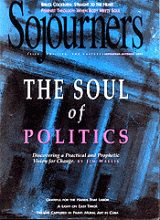ROSEMARY Radford Ruether’s eloquent article about the ingrained fallibilities of the organized church ("Why I Stay in the Church," July 1994) warns us that when we think we can encompass God with words we blaspheme. When we confuse the fallibility of human words and human organizations with the mysterious infallibility of God we invite all kinds of dangerous fanaticism.
The word "church" has at least four meanings: the building (two blocks down there and turn right); the congregation (the church will vote on this after next Sunday’s worship service); the hierarchy (bishop, pope, council, annual conference); and the holy fellowship—down through the ages, around the world, and across denominational lines, the followers of the way that includes famous saints and countless nameless pilgrims. If Jesus really did say—"on this rock I will build my church," he only could have meant this fourth definition.
The need for organization was not very dangerous until Constantine the Great proclaimed Christianity legal. Then "power plays" became too tempting. James Hastings Nichols, in his book Primer for Protestants, reminds us that the Reformation is not enough; church organizational structures need review and "reformation" at least every third generation.
Recognizing the need for functional organization, followers of the way must support the church in its other three phases as they insist on the centrality of the way, not the organization.
Read the Full Article
